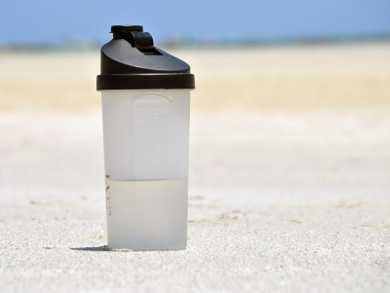The student competition “TUM DeSal Challenge” at the Technical University of Munich (TUM), Germany, invites students to build seawater desalination plants powered solely by renewable energies. Providing a sufficient supply of clean drinking water is problematic in many parts of the world, and the ideas of the young participants could be one step on the way to self-sufficient desalination plants for developing countries.
The jury has nominated 12 teams of participants to take part in the finals in Munich on June 17–18, 2016, where they will present their working desalination devices. The plants will be judged on the quality of the produced fresh water, but also on design, cost efficiency, ease of use, and innovation.
One of the finalists, Team Solarpura, previously talked to Catharina Goedecke for ChemViews Magazine about their first experiences with the competition. The team’s members are all students at TUM: Felipe Díaz Bórquez from Chile, Peter Brailovsky Signoret from Mexico (team leader), Ismael Leitmannstetter from Germany, and Kevin Lemmer from the United States. Here, the students explain their approach to providing save drinking water and give an update on their progress.
How did you decide on your approach to desalination?
We were interested in an approach that does not require highly technical specialized equipment, but utilizes the existing infrastructure of homes or community kitchens typical for rural communities across the globe. With this in mind, we evaluated the technologies based on their productivity and cost. This led us to a humidification-dehumidification system which utilizes direct solar energy with roof-mounted collectors and waste heat from wood-burning stoves.
Did the entries in the previous challenges inspire your desalination plant?
Nope, the main inspiration for our plant came from understanding the main problems that people who lack drinking water have and finding the best solutions for their situation.
What progress have you made on your desalination plant?
We have built the structure to support the plant and feed salt water through the system with hydrostatic pressure. We have also constructed the solar collectors and we are nearly done with the humidification-dehumidification unit. There is still a lot of work to be done in the last month – especially testing the system – but we are excited about the challenge.
Have there been any new challenges for you?
Some, for example, securing flow in the system and protecting components from overheating with a limited gravity-powered system, dealing with used components, and the ever-present time pressure. During planning, we didn’t foresee that some of the pieces of the plant could become an interesting problem to implement. Basically, many small details can result in a big problem to deal with during the construction of the plant.
Do you have an idea what the other teams are doing?
We have knowledge of the basic concepts the other teams are implementing from the finalist announcement. Now, perhaps more information will become available with the project videos submitted for the challenge. However, we are more focused on our concept – a technology that can be constructed and maintained in rural communities with simple, local materials and labor while taking advantage of the existing infrastructure to provide people with reliable drinking water, independent from expensive alternatives.
What do you think your chances are in the competition?
It really is a journey into the great unknown. We aren’t sure of the other teams’ progress and have yet to produce water. However, we like our idea, we are learning a lot, and we think we’ll have a strong showing the day of the competition. I wouldn’t put money on us as one of the favorites, but perhaps as a dark horse.
Thank you for the update and good luck in the finals!
On June 17–18, 2016, the jury will decide if this team or one of the other eleven finalists has developed the best desalination plant. ChemViews Magazine will report the results.
Our previous interview with Team Solarpura
- TUM DeSal Challenge 2016 – First Experiences,
Catharina Goedecke, Felipe Díaz Bórquez, Peter Brailovsky Signoret, Ismael Leitmannstetter, Kevin Lemmer,
ChemViews Mag. 2016.
DOI: 10.1002/chemv.201600036
Student competition on seawater desalination
Promotion video for Team Solarpura on the TUM DeSal Challenge YouTube Channel
Also of Interest
- Competition to Design Energy Self-sufficient Desalination Plants,
Vera Koester,
ChemViews Mag. 2013.
DOI: 10.1002/chemv.201300095
19 years old winner of the TUM DeSal Challenge talks about the challenges of developing and building his very successful desalination plant - Videos introducing the competitors in the 2011 TUM DeSal Challenge
- Building Desalination Plants with DeSal Organizer A. Kroiß,
Sarah Millar,
ChemViews Mag. 2011.
DOI: 10.1002/chemv.201000115
Alex Kroiß, organizer of the DeSal Challenge, Munich, Germany, discusses the event and what inspired him to get involved - Desalination in the Rain: The 2011 TUM DeSal Challenge,
Sarah Millar,
ChemViews Mag. 2011.
DOI: 10.1002/chemv.201000116
The DeSal Challenge at the Technical University Munich provided new ideas for desalination and much fresh water despite the rain




